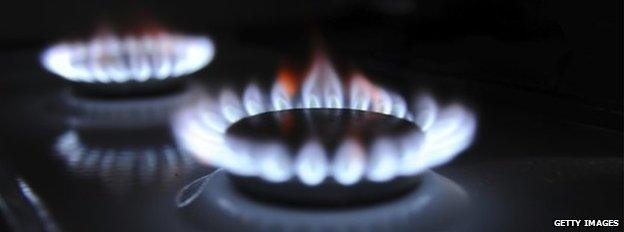Energy bills could be much lower - Which?
- Published
- comments
Richard Lloyd, Which? executive director: "The market isn't working properly"
Recent cuts in consumer energy bills could have been much bigger and made much earlier, research from consumer body Which? has found.
It said energy suppliers had failed to keep standard variable energy tariffs in line with falling wholesale prices over the past two years.
As a result, households on standard energy tariffs were £145 worse off last year, or a total of £2.9bn, it said.
Industry body Energy UK said firms had cut prices as soon as they could.
Which? executive director Richard Lloyd said: "Our analysis places a massive question mark over how suppliers have been setting prices over the last two years.
"They now need to explain to their customers why bills don't fall further in response to dropping wholesale prices."
Currently the big six energy firms - SSE, Scottish Power, Centrica, RWE Npower, E.On and EDF Energy - together account for about 95% of the UK's energy supply market.
Which? said the presence in the market of a range of smaller suppliers offering lower prices did not appear to be exerting sufficient competitive pressure on these major suppliers to cut energy bills faster and further.
"In a genuinely competitive market suppliers would be forced to be more efficient and to keep their prices in check as wholesale costs fall," it said.
However, Energy UK chief executive Lawrence Slade told the BBC that because suppliers bought wholesale gas on the futures market, to try to hedge - or protect - themselves - against future price rises, they didn't immediately benefit from falls in wholesale prices.
"As prices are falling, as companies can actually afford to pass those savings on, they are doing so.
You can't suddenly pass the savings in one chunk, it's only as your buying strategy unwinds and as you can take advantage of those new lower wholesale prices that you can pass these on to your customers," he added.

Analysis

John Moylan, BBC Industry correspondent
How, when and for how much the big suppliers buy gas and electricity in advance has been a contentious issue for years.
Buying ahead guarantees supplies. It also means customers don't have the uncertainty of volatile day-to-day prices.
But the firms don't publish their "hedging" strategies. How do we know that they pass on savings when they can?
This research attempts to shine a light on this opaque world.
The conclusions will make tough reading for the firms with the suggestion that households have faced billions in higher costs in the past and could be missing out on savings of hundreds of millions of pounds in the year ahead.
Whether the firms really are playing fair by their customers may only become clear when the Competition and Markets Authority delivers the findings of its investigation into the sector later this year.

Wholesale energy costs, which make up the bulk of energy bills, have more than halved over the past six months, with the price of a barrel of Brent Crude oil currently below $55.
Which? said the recent price cuts in standard gas tariff rates made by all six energy suppliers did not go far enough.
Based on wholesale prices in late January, it said the cuts of up to 5.1%, should actually have been up to 10.3%.
And it found that standard variable electricity tariffs, which have not been cut, should be reduced by 15%.
Which? said it had submitted its evidence to the ongoing Competition and Markets Authority's investigation of the energy market - set to conclude by the end of the year - as well as the Treasury's investigation into whether energy companies are passing on the savings from falls in the wholesale price of oil.